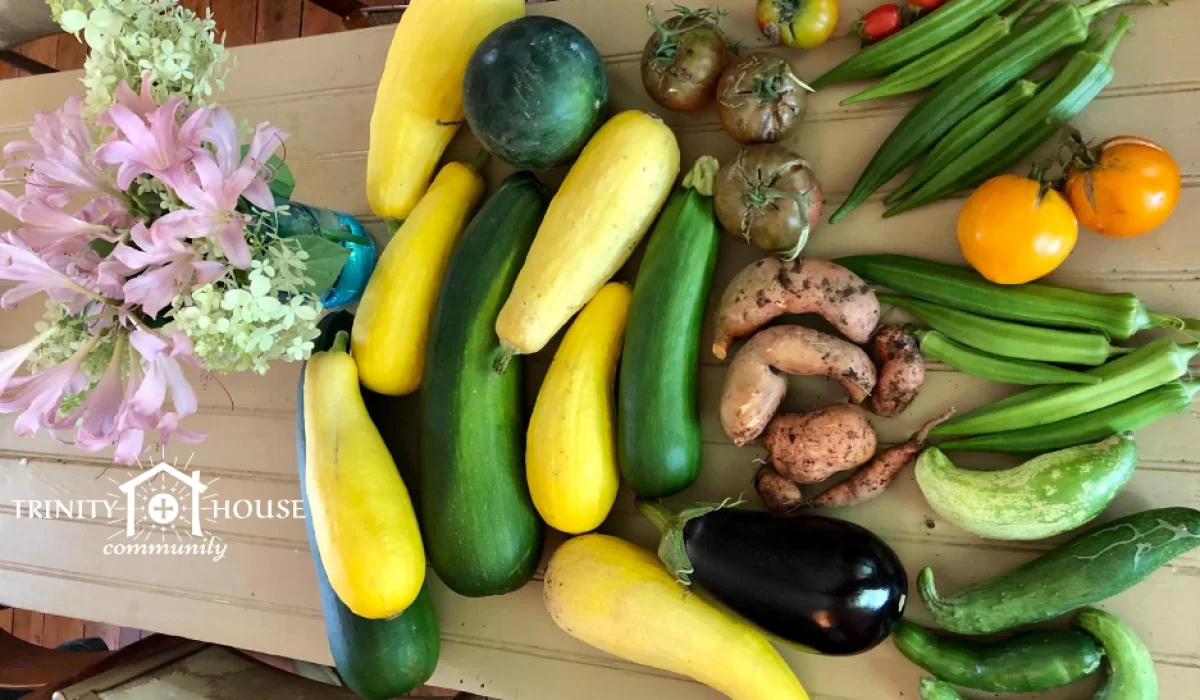“What is that?!” our 15-year-old son asked incredulously the other day, pointing to a three-block long line of cars in town.
It was a drive-thru lunch line set up in a vacant building by a local initiative that provides more than 100 free lunches daily. With grocery prices spiking—beef is up 20% since February, and poultry is up 11%—people are hurting. In a recent Census Bureau survey, over 30 million Americans reported that they did not have enough to eat.
As we watched the line, the sharp contrast in our country was so obvious. On the one hand, so many face food shortages, while on the other, our familiar cultural excesses continue: from supersize portions at fast-food restaurants to king-size candy bars and other “biggie” approaches to more and more food.
With this imbalance between “excess” and “deficiency” so visible in today’s crisis, has there ever been a better time for us as families to reevaluate our relationship with food and how it connects with our faith?
In the 3rd week of each month, we turn our focus to Household Economy, Level 3 of your Trinity House. The growing or purchasing of food, its preparation, storage, and the enjoyment of it are all central to Level 3. Just like the average American family, our family has plenty of food issues—overconsumption, waste, lack of true nutritive value—so we welcome the opportunity to consider this tough but important subject in the light of our faith.
Pope Francis has long raised alarms about a “throwaway culture,” so it’s no surprise to find in a recent letter of his three signposts that he suggests can help us to better appreciate food:
If we’re honest, so often, when it comes to food, we lose sight of this call to conversion, gratitude and simplicity. After all, ours is an instant-gratification culture, and it’s easy to begin taking our 24/7 access to a wide array of food for granted. In our less admirable moments, we find that ingratitude and increasingly “complex tastes” damage our relationship with food and obscure the connection between food and faith.
So how do we apply lofty principles like conversion, gratitude and simplicity to our daily challenges with food and drink?
We can begin by acknowledging that our bodies are “temples of the Holy Spirit” and that this “conversion” to which we are called is far more than a set of “green-friendly” tips. It’s a way of life—a stewardship of our bodies that extends to our environment—which is part and parcel of our Christian witness.
We’ve lived in our current home for ten years and have made very modest progress in vegetable gardening. But this year, the pandemic helped us slow down and take our garden more seriously. Just in the past few weeks, we’ve picked a few bushel-loads (pictured above) of squash, zucchini, tomatoes, and more from our garden.
From planting to tending to harvesting, gardening as a family has brought us together to marvel at God’s gifts—the abundance of creation, the chance to pick and prepare food together, and to share with neighbors. It has also caused us to think more carefully about food and our relationship to it. When you spend that much time cultivating it, you look at food differently, as something to be savored and shared, not to be consumed unthinkingly or wasted.
The coming months will likely see grocery bills increase even more and cause us to continue to scrutinize our relationship with food. As we do, here are three practical recommendations:
1) Reflect on and pray about conversion, gratitude and simplicity in our own relationship with food and how we connect food to faith. Are we skipping grace at meals, overeating, rushing dinner, or eating out too much? In our homes, are we mindful that our table reflects, in a beautiful way, the Eucharistic table? As parents, we set the tone. Any transformation we experience will be a gift to our spouse and children. By giving our children the gift of gratitude for food, we send them into life with a trusty compass for the many decisions they will make with regard to nutrition and health.
2) Fast. Consider fasting on Fridays—and not just during Lent. Or, consider fasting before other important feast days. By abstaining from meat or meals—whether it’s from one meal, or for an entire day—we can create the space to better focus on Christ’s passion, how he is our true food, and how he provides for our daily needs. Fasting on a regular basis can renew our relationship with food, allowing us to experience fresh gratitude for it.
3) Donate financially or with your time to soup kitchens and food banks. The other day, we made an egg casserole, wrapped up half for a neighbor, and sent one of our kids to walk it over. That’s a simple win-win for our family’s time together and the care we want to show for our neighbors. But we can’t stop there. With food insecurity affecting 30 million Americans, each of us who has the wherewithal needs to step forward and find opportunities to donate food, our financial resources, or our volunteer time.
From the Old Testament manna to Jesus offering himself to nourish us in the Eucharist, faith has always connected food with God’s provision and our gratitude for his gift of life. May we enjoy his many gifts to us, even the very simple ones, and also consider how to pass on his gifts to those in need. As the Apostle Paul wrote in Corinthians, “So whether you eat or drink or whatever you do, do it all for the glory of God.”
Amen to that!
It was a drive-thru lunch line set up in a vacant building by a local initiative that provides more than 100 free lunches daily. With grocery prices spiking—beef is up 20% since February, and poultry is up 11%—people are hurting. In a recent Census Bureau survey, over 30 million Americans reported that they did not have enough to eat.
As we watched the line, the sharp contrast in our country was so obvious. On the one hand, so many face food shortages, while on the other, our familiar cultural excesses continue: from supersize portions at fast-food restaurants to king-size candy bars and other “biggie” approaches to more and more food.
With this imbalance between “excess” and “deficiency” so visible in today’s crisis, has there ever been a better time for us as families to reevaluate our relationship with food and how it connects with our faith?
In the 3rd week of each month, we turn our focus to Household Economy, Level 3 of your Trinity House. The growing or purchasing of food, its preparation, storage, and the enjoyment of it are all central to Level 3. Just like the average American family, our family has plenty of food issues—overconsumption, waste, lack of true nutritive value—so we welcome the opportunity to consider this tough but important subject in the light of our faith.
Pope Francis has long raised alarms about a “throwaway culture,” so it’s no surprise to find in a recent letter of his three signposts that he suggests can help us to better appreciate food:
- Conversion. Citing the problems which result from 820 million suffering from hunger throughout the world alongside an abundant food supply, Pope Francis said, “This reality calls for a conversion in our way of living and acting.”
- Gratitude. Pope Francis calls for a “cultivation of lifestyles inspired by gratitude for the gifts we have received and the adoption of a spirit of temperance, moderation, abstinence, self-control and solidarity.”
- Simplicity. Virtues such as temperance and moderation, he continues, “summon us to a more simple and sober life, and unfailing concern for the needs of those around us.”
If we’re honest, so often, when it comes to food, we lose sight of this call to conversion, gratitude and simplicity. After all, ours is an instant-gratification culture, and it’s easy to begin taking our 24/7 access to a wide array of food for granted. In our less admirable moments, we find that ingratitude and increasingly “complex tastes” damage our relationship with food and obscure the connection between food and faith.
So how do we apply lofty principles like conversion, gratitude and simplicity to our daily challenges with food and drink?
We can begin by acknowledging that our bodies are “temples of the Holy Spirit” and that this “conversion” to which we are called is far more than a set of “green-friendly” tips. It’s a way of life—a stewardship of our bodies that extends to our environment—which is part and parcel of our Christian witness.
We’ve lived in our current home for ten years and have made very modest progress in vegetable gardening. But this year, the pandemic helped us slow down and take our garden more seriously. Just in the past few weeks, we’ve picked a few bushel-loads (pictured above) of squash, zucchini, tomatoes, and more from our garden.
From planting to tending to harvesting, gardening as a family has brought us together to marvel at God’s gifts—the abundance of creation, the chance to pick and prepare food together, and to share with neighbors. It has also caused us to think more carefully about food and our relationship to it. When you spend that much time cultivating it, you look at food differently, as something to be savored and shared, not to be consumed unthinkingly or wasted.
The coming months will likely see grocery bills increase even more and cause us to continue to scrutinize our relationship with food. As we do, here are three practical recommendations:
1) Reflect on and pray about conversion, gratitude and simplicity in our own relationship with food and how we connect food to faith. Are we skipping grace at meals, overeating, rushing dinner, or eating out too much? In our homes, are we mindful that our table reflects, in a beautiful way, the Eucharistic table? As parents, we set the tone. Any transformation we experience will be a gift to our spouse and children. By giving our children the gift of gratitude for food, we send them into life with a trusty compass for the many decisions they will make with regard to nutrition and health.
2) Fast. Consider fasting on Fridays—and not just during Lent. Or, consider fasting before other important feast days. By abstaining from meat or meals—whether it’s from one meal, or for an entire day—we can create the space to better focus on Christ’s passion, how he is our true food, and how he provides for our daily needs. Fasting on a regular basis can renew our relationship with food, allowing us to experience fresh gratitude for it.
3) Donate financially or with your time to soup kitchens and food banks. The other day, we made an egg casserole, wrapped up half for a neighbor, and sent one of our kids to walk it over. That’s a simple win-win for our family’s time together and the care we want to show for our neighbors. But we can’t stop there. With food insecurity affecting 30 million Americans, each of us who has the wherewithal needs to step forward and find opportunities to donate food, our financial resources, or our volunteer time.
From the Old Testament manna to Jesus offering himself to nourish us in the Eucharist, faith has always connected food with God’s provision and our gratitude for his gift of life. May we enjoy his many gifts to us, even the very simple ones, and also consider how to pass on his gifts to those in need. As the Apostle Paul wrote in Corinthians, “So whether you eat or drink or whatever you do, do it all for the glory of God.”
Amen to that!
Heaven in Your Home Toolkit
“For I Was Hungry and You Gave Me Food: Catholic Reflections on Food, Farmers, and Farmworkers,” by the U.S. Conference of Catholic Bishops, contains brief summaries of Catholic Social Teaching on food, agriculture, and more.
“How Eating Like a Catholic Can Change Your Life” at Aleteia features an interview with Emily Stimpson Chapman, author of The Catholic Table: Finding Joy Where Food and Faith Meet. She explains, “Food tastes good because God wanted us to enjoy eating. There is so much love from God in every bite of food and when you sit down to a delicious meal, recognizing how much God loves you through that meal is the most important thing you can do.”
In “Food for Body & Soul: Honoring God by How You Eat” by Elizabeth Bayardi for LifeTeen, she writes, “When we nourish our bodies with good food, we are affirming the dignity we have as children of God and preparing ourselves to carry out the work of God here on Earth.”
In this 8-min. video entitled “4 Reasons for Fasting,” Fr. Mike Schmitz explains that fasting is about “self-mastery, discernment and sacrifice.”
“What’s the Point of Fasting Anyway?” at Catholic News Agency offers a good overview of the basics of fasting—from its history, to its biblical basis, to looking at our motivation.
For our readers who live in northern or central Virginia, here is the homepage for the inspiring St. Lucy Food Project of Catholic Charities. The page includes information for making donations, volunteering, and upcoming no-contact drive-thru food drives.
Enjoying the weekly Heaven in Your Home Letter in your inbox? Share it with a friend and encourage them to sign up to receive this weekly boost of inspiration and practical tools! Signing up takes just a few seconds at www.trinityhousecommunity.org.
Testimonial
“To further their mission of inspiring families to live together with God, the Trinity House Community has forged a new initiative—the Heaven in Your Home Workshop. I endorse this initiative, as it seeks to build a better community by recognizing families as the foundation of society and supporting parents in their role as the primary educators.” —Most Rev. Michael F. Burbidge, Bishop of Arlington
Please Join Us In Prayer
“For I Was Hungry and You Gave Me Food: Catholic Reflections on Food, Farmers, and Farmworkers,” by the U.S. Conference of Catholic Bishops, contains brief summaries of Catholic Social Teaching on food, agriculture, and more.
“How Eating Like a Catholic Can Change Your Life” at Aleteia features an interview with Emily Stimpson Chapman, author of The Catholic Table: Finding Joy Where Food and Faith Meet. She explains, “Food tastes good because God wanted us to enjoy eating. There is so much love from God in every bite of food and when you sit down to a delicious meal, recognizing how much God loves you through that meal is the most important thing you can do.”
In “Food for Body & Soul: Honoring God by How You Eat” by Elizabeth Bayardi for LifeTeen, she writes, “When we nourish our bodies with good food, we are affirming the dignity we have as children of God and preparing ourselves to carry out the work of God here on Earth.”
In this 8-min. video entitled “4 Reasons for Fasting,” Fr. Mike Schmitz explains that fasting is about “self-mastery, discernment and sacrifice.”
“What’s the Point of Fasting Anyway?” at Catholic News Agency offers a good overview of the basics of fasting—from its history, to its biblical basis, to looking at our motivation.
For our readers who live in northern or central Virginia, here is the homepage for the inspiring St. Lucy Food Project of Catholic Charities. The page includes information for making donations, volunteering, and upcoming no-contact drive-thru food drives.
Enjoying the weekly Heaven in Your Home Letter in your inbox? Share it with a friend and encourage them to sign up to receive this weekly boost of inspiration and practical tools! Signing up takes just a few seconds at www.trinityhousecommunity.org.
Testimonial
“To further their mission of inspiring families to live together with God, the Trinity House Community has forged a new initiative—the Heaven in Your Home Workshop. I endorse this initiative, as it seeks to build a better community by recognizing families as the foundation of society and supporting parents in their role as the primary educators.” —Most Rev. Michael F. Burbidge, Bishop of Arlington
Please Join Us In Prayer
- For all families facing decisions regarding schooling this fall, that they might seek wisdom, prudence, and patience from the Lord;
- For all students, that they might grow in wisdom, age and grace in the coming academic year;
- For all individuals and families, that they might deepen their roots in the grace, peace, and love of Jesus Christ during this time of uncertainty;
- For healing for those struggling with COVID-19, and for strength and safety for all medical personnel;
- For the staff and ministry of Trinity House Cafe, and all Heaven in Your Home Workshop participants;
- For unity and healing in our nation, and for wisdom for all public officials;
- For all parents, that they may be refreshed and renewed on a daily basis by the Lord in prayer, as they seek to lead their families through the uncertainties of this time.
 In Christ,
In Christ,Soren & Ever Johnson
Founders & Directors
Trinity House Community
Making Home a Little Taste of Heaven




